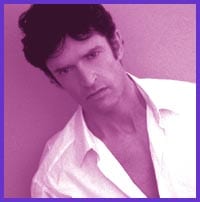Gorgeous, witty, talented and out. What’s not to love?
Rupert Everett has been the number one Boys Own Companion since his film debut in 1984’s Another Country.
Though Everett didn’t come out till 1989, who among us didn’t fall immediately for his portrayal of budding gay Communist Guy Burgess? Karl Marx, himself, could not have resisted the 24-year-old’s sensual lips, come-to-bed eyes and brunette pompadour.
More than 15 years later, Everett is still in the vanguard struggle to change the political economy of Hollywood, trying to prove once and for all that an out gay leading man can be a money-maker.
“If this film makes money,” Everett says about his forthcoming flick, The Next Best Thing (opening Fri, Mar 3), “there’ll be a slew of gay characters in films of a much more forward thinking type.
“It’s not just a very important film just for me, it’s an important film for everyone.”
The Next Best Thing is a comedy drama starring Everett, as a gay landscape architect, and Madonna, as his yoga-instructing best friend, who becomes pregnant after a chance, drunken encounter with Everett.
The pair decide to raise the kid together. But trouble soon enters Sodom and Eve’s enchanted garden in the form of another man and a nasty custody battle.
“The starting point for the character was the leaping off point for my character in My Best Friend’s Wedding,” says Everett. “I’d scored a hit with mainstream audiences in America by playing a kind of charming, debonair, drawing-room-comedy gay guy, and I wanted to take that success another step further.
“So this story seemed ideal because it started in a very charming mode and then the story takes a twist.
“I wanted to show everything,” says Everett, “in terms of showing myself as over-the-top campy all the way across to just being a dad trying to fight for keeping his kid.”
The film’s rumination on the nature of family revolves around the intense friendship between the characters of Everett and Madonna (who count each other as close friends in real life). The barbed banter is an homage to films like the Thin Man series with Myrna Loy and William Powell.
“We wanted to make it like American comedies of the ’40s,” says Everett. “They were really brilliant, fast and sharp, and more dangerous than they were for many years afterwards.”
The Next Best Thing is directed by Academy Award-winning director John Schlesinger. His seminal gay film of 1972, Sunday Bloody Sunday, was the first Schlesinger film Everett saw. “I caught up with it in 1978 or ’79. And it had an enormous impact on me. It’s an amazing movie. And certainly it was one of the reasons why I wanted John to make our movie.”
(Everett then lightheartedly jibes his long-standing friend for ripping off Another Country in An Englishman Abroad, the TV movie Schlesinger made about Guy Burgess.)
In addition to The Next Best Thing, Everett just finished filming Unconditional Love by PJ Hogan (the director of My Best Friend’s Wedding), a murder mystery with music, starring Kathy Bates, Barry Manilow, Sally Jesse Raphael and Everett’s fave celeb, Julie Andrews. He’s also adapting to the screen his hilarious book, the semi-autobiographical Hello Darling, Are You Working?
In person, Everett is effortlessly charming, which meanss he doesn’t have to be too forthcoming. But once in a while he lets fly a zinger that proves cool waters run deep.
When someone extols as wonderful actor Richard E Grant’s memoir With Nails because it bursts the glamourous bubble surrounding film shoots, Everett rolls his eyes and quips, “I could go through that in one paragraph: It’s not what its meant to be, it’s actually quite boring. Signed: Richard E Grant.”
The 40-year-old Everett is quite willing to contemplate what it means to age – though he’s buffed and beautiful as ever. “I think one of the things that gay guys and women have in common is that they become invisible at some point…. Getting old is difficult.
“[Gay men] don’t have any clue about the aging process,” he continues. “You suddenly find yourself in a tie-dyed T-shirt and a backwards-facing cap, age of 55, because nobody told you you weren’t 20 anymore. I think when you come into your 40s as a gay guy, it’s definitely a strange time. You’re totally unprepared for it because you don’t have a kid, or a mortgage… all those reminders that straight people have about their age.”
With a wry smile, he looks into his future. “It’s a very much smaller [entertainment] industry in England. You start very young in a miniseries in India, and gradually develop relationships with all those wacky character actors you know you’re about to become as soon as your hair all falls out.
“There’s lots of roles for old eccentric English people – all the way around the world. We’re very marketable like that.”
With the mainstream media still harping on his homosexuality and with a career that has rocketed him up and down and up like the space shuttle, Everett seems remarkably at ease with his role as film star and gay champion.
“When you’re a kid, you feel put upon all the time when you become a celebrity. When you’re older, you don’t feel put upon in the same way; you feel it’s lucky to come by. So I try to have a more practical approach – though I am, by the minute, becoming more and more the diva.”


 Why you can trust Xtra
Why you can trust Xtra


